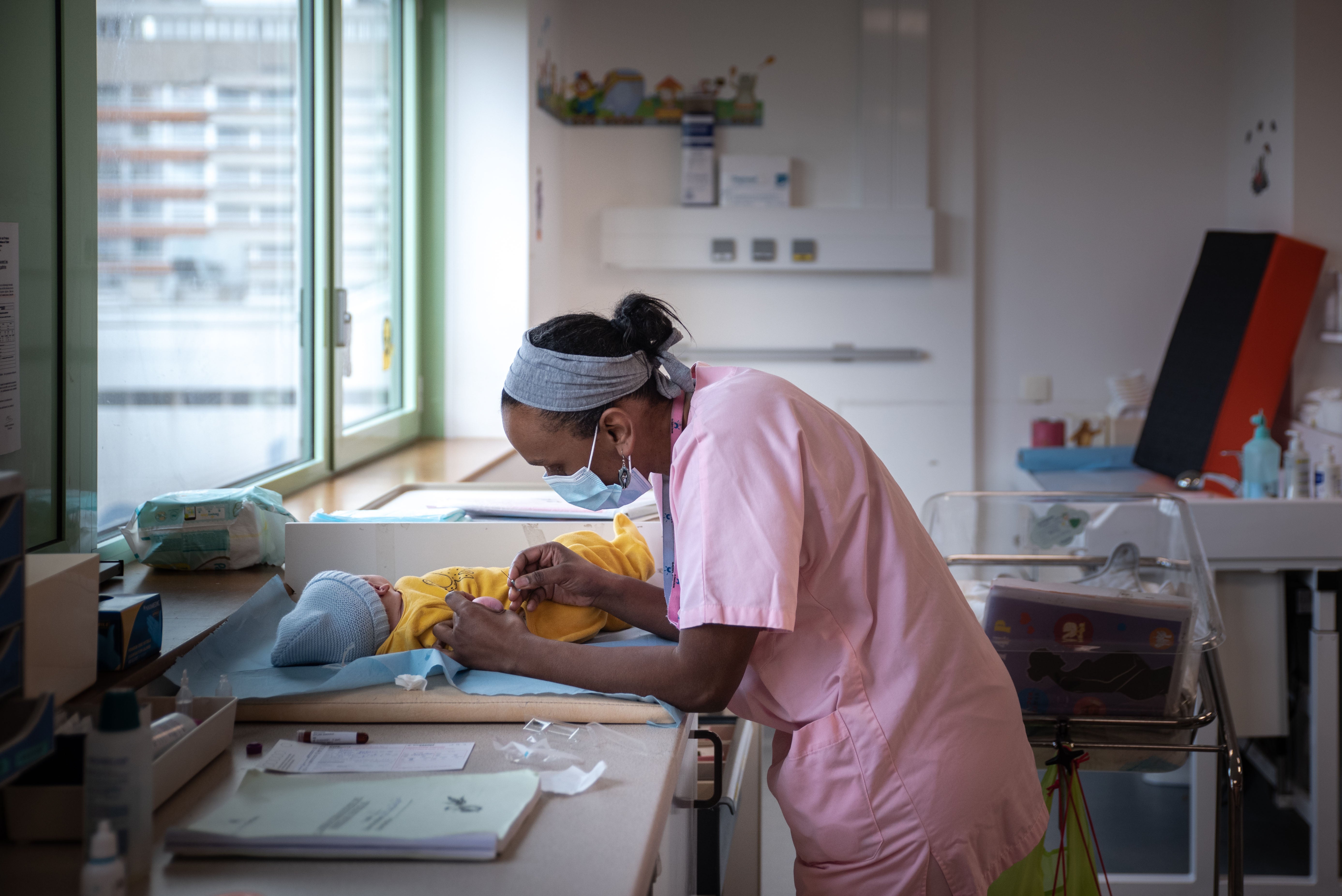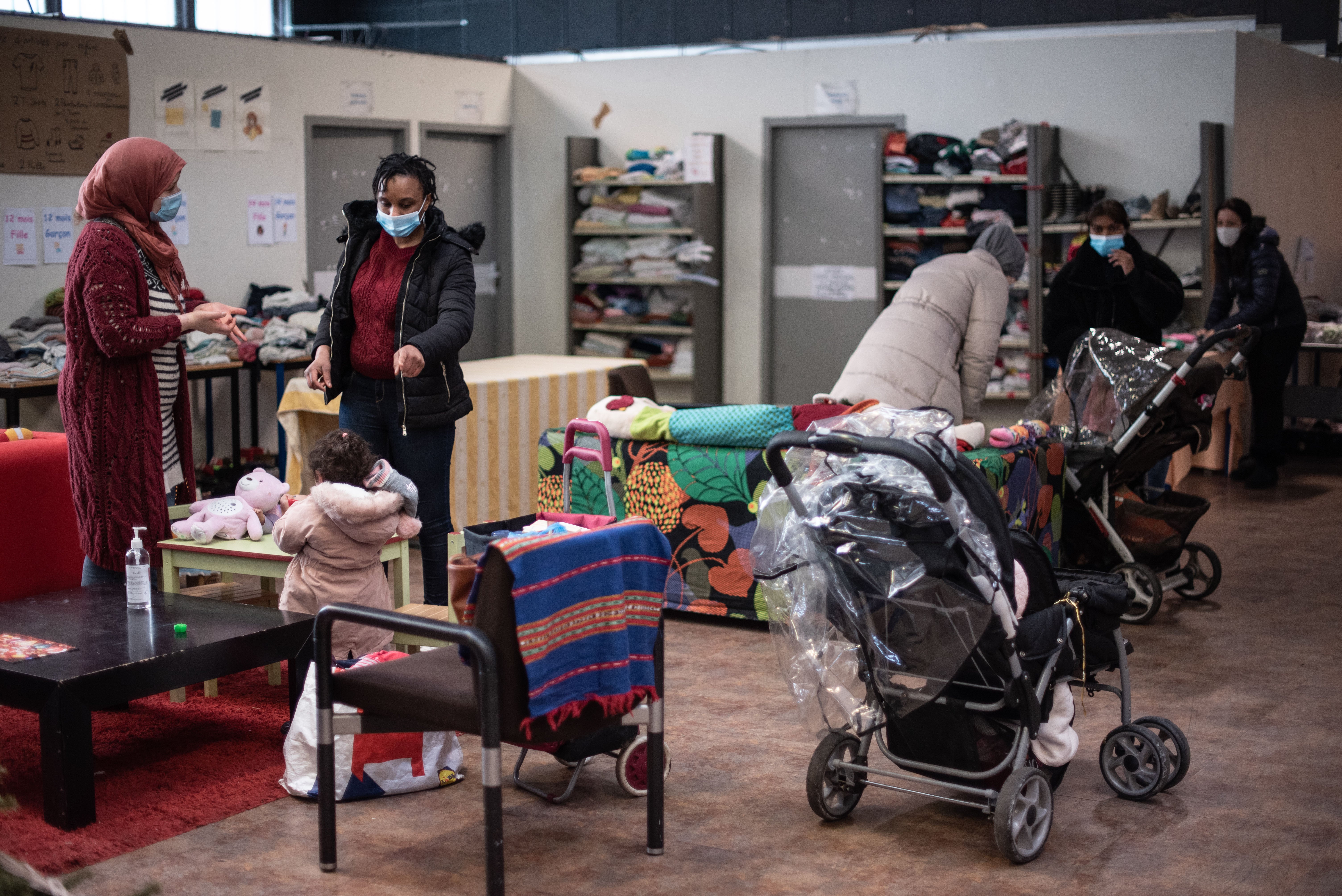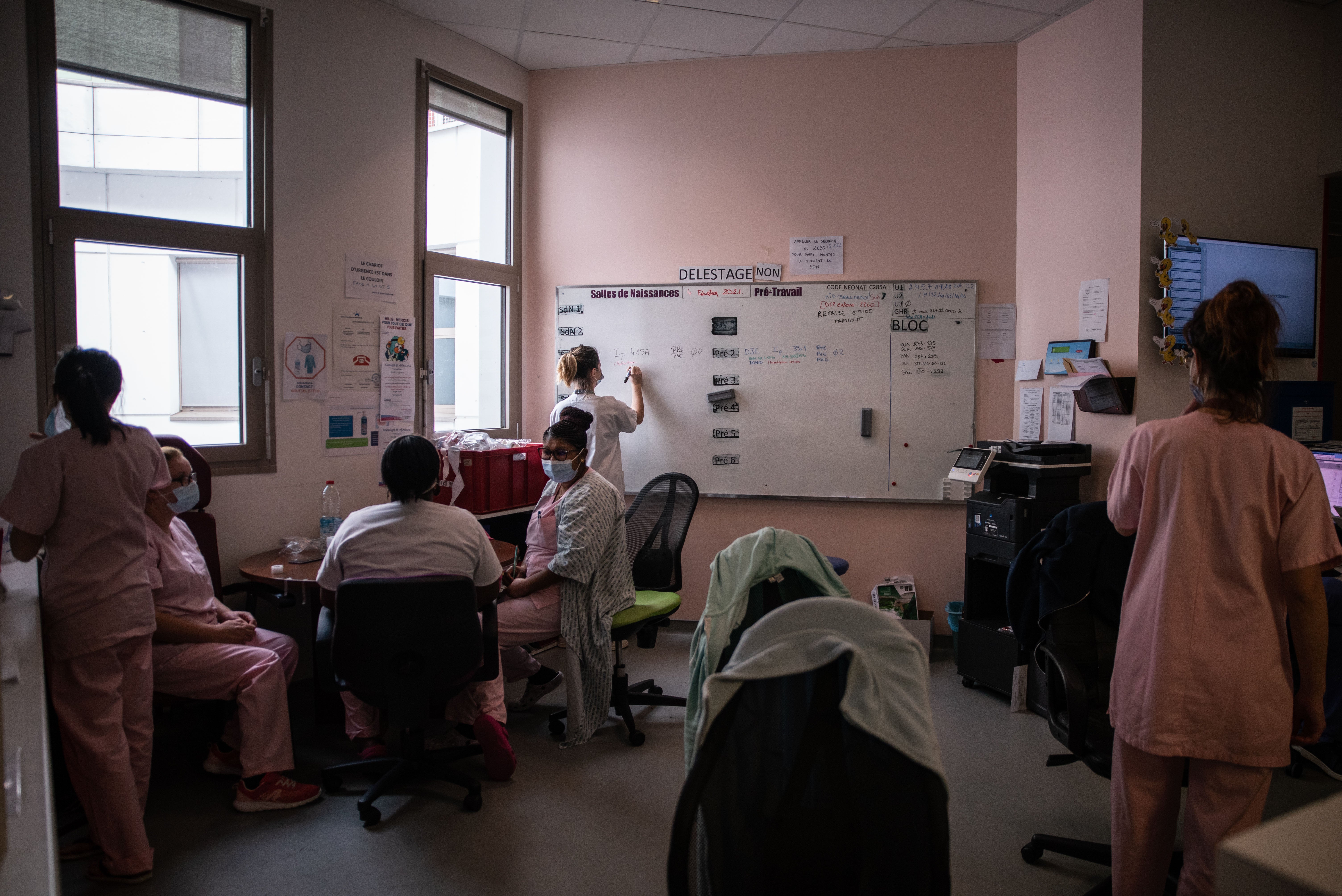France is having a ‘baby bust’ nine months after the first lockdown
Contrary to expectations, the country is experiencing a decline in birth rates, writes Rick Noack

When France confined more than 64 million people under one of the world’s strictest coronavirus lockdowns last spring, there was widespread speculation that a baby boom would follow.
“I thought to myself: They're all stuck at home, and they need to occupy themselves. So, they’ll make babies,” recalls Martine Mabiala Moussirou, a midwife coordinator at the main public hospital in Saint-Denis, a city on the outskirts of Paris that has one of France’s highest birth rates.
Nine months on, though, instead of a boom, France is witnessing a sharp decline in births. Economic uncertainty, social stress and in some cases anxieties about the virus itself appear to have prompted families to abandon or postpone plans to have a baby.
The number of babies born at the Saint-Denis hospital plummeted by about 20 per cent between mid-December and mid-January and is expected to remain below 2020 levels for at least the first half of the year. While the coronavirus wards are hives of activity, lights in the maternity ward are dimmed and the corridors empty.
“Usually, it’s bustling here,” says Mabiala Moussirou, who is chatting with other midwives next to a board showing the occupancy status of the ward’s nine delivery rooms.
Only one is in use.
Other maternity wards in France are reporting similar trends, as are cities in Italy. A drop in births is predicted for the United States, as well.
The unusually quiet hospital wards are an early sign of how the pandemic may indirectly shape demographics. They are also one of many indications of the toll on women.
Some developing countries are registering the beginnings of a baby boom, triggered in part by reduced funding for and access to contraceptives and family-planning services during the pandemic.
But in France and other developed countries, a pandemic birth slump is emerging, with implications for decades to come.

The full effect of the coronavirus pandemic on France’s birth rate won’t be known for months. But experts are increasingly confident that the sudden drops in some hospitals are too steep, widespread and abrupt to be coincidental.
“We’re seeing the decline everywhere across the northeast of France,” says Olivier Morel, academic director of the obstetrics and gynaecology department at the University Hospital in Nancy.
At the five big university hospitals in the region, births declined between 10 per cent and 25 per cent in January compared with the same month last year, according to figures provided by Morel.
Those drops are far steeper than the normal year-on-year variations, which are usually in the low single digits.
“Throughout my career, I have never seen a 10 to 25 per cent decline,” Morel says.
Further south in Lyon, France’s second-biggest metropolitan area, two hospitals say they recorded a combined 19 per cent decline in births in January – a drop they attribute to the pandemic.
Italy experienced Europe’s first major outbreak and was the first western country to declare a national lockdown last March. Births declined by more than 21 per cent across 15 major Italian cities in December, according to a report published by the country’s statistics institute last week.
By contrast, hospitals in the German capital of Berlin have so far not noticed a significant downward trend, but the city was hit less severely than hotspots in France and Italy and didn’t impose the same level of lockdown.
Demographers aren’t as surprised by the drop in births as health workers in France appear to be.
Women came asking for an abortion because, they said, ‘I cannot have kids with someone who became so violent during the lockdown’
“Fertility has historically been sensitive to cyclical events such as wars, economic crises, epidemics and even to climatic conditions,” says Arnaud Regnier-Loilier, director of research at France’s National Institute for Demographic Studies. “These events all result in a decrease and not an increase in births.”
The Greek financial crisis, for example, contributed to a baby bust.
Sometimes, the impact transcends borders. Nine months after the 1986 Chernobyl disaster, for example, demographers noticed an unusually low birthrate in Italy.
Researchers suspect that multiple factors associated with the coronavirus pandemic may be depressing fertility rates.
Economic uncertainty is a big one. People thinking last spring about whether to have a baby may have found themselves out of work or seen that major economies were experiencing record contractions. In France, the economy shrank by 5.8 per cent in the first quarter of 2020, the largest decline since record-keeping began in 1949, according to the national statistics office.
Although France and other European governments were quick to offer subsidies for furloughed workers, it was with the understanding that such support would be temporary and that some industries might not recover any time soon. This left many people feeling less than secure.
The constraints of lockdown may also have meant that couples felt disinclined to add to their families. Some families felt the pressure of having older children at home while schools were closed. Some couples may have found that constant proximity strained their relationship. Some might have calculated that the need to shield older relatives would reduce the support they would get as new parents.
Researchers are also exploring how the severity of coronavirus outbreaks may have influenced family-planning decisions. Some areas of France now reporting a drop in births were also among the hardest-hit areas during the first wave of infections, suggesting a possible correlation.
Saint-Denis is a place where multiple stresses collided.

It is one of France’s poorest cities, located in a region with one of the highest excess mortality rates due to Covid.
Many of its 110,000 residents were barely managing to stay afloat before the pandemic. When the virus hit, the city’s informal economy collapsed, leaving undocumented immigrants without income or any way to qualify for unemployment benefits. The closure of schools meant that children could no longer get the heavily subsidised meals many families had relied on.
In the cramped apartments of Saint-Denis’s housing projects, enduring the spring lockdown, when people were allowed to go out only once a day and only for essential reasons, was especially hard.
Those conditions helped propel riots in the Parisian suburbs in late April – and may have depressed fertility rates, as well.
The lockdown led to a surge in domestic violence, says Ghada Hatem-Gantzer, a obstetrician who heads a hospital-linked centre for women in Saint-Denis.
“More than usual, women came asking for an abortion because, they said, ‘I cannot have kids with someone who became so violent during the lockdown,’” Hatem-Gantzer says.
But while the proportion of women citing that reason increased last year, the overall number of abortions did not, she says.
MaMaMa, a local charity set up to support mothers and babies through the pandemic, hasn’t yet seen the impact of declining births. In a 15,000-square-foot warehouse, volunteers still welcome a constant stream of mothers coming for free essentials, such as bottles, food and clothes. But the financial strains that bring women to MaMaMa may also prevent future births.
Nogochami, 27, is awaiting her turn at MaMaMa, wheeling her sleeping 8-month-old in a pushchair. The baby was born during France’s first lockdown, at a time when the family’s income had dropped to a few euros a day.
“We’ll wait a very long time until the next child,” says Nogochami, who gives only her first name because she is an undocumented migrant from Ivory Coast. “Everything is very difficult. I just can't have another one now.”
Mabiala Moussirou, the midwife coordinator, says she is still hoping for a speedy rebound in births, even a boom, once women regain confidence about the future. But some colleagues are less optimistic.
While the economy in France and some other European countries had slowed less than expected by the end of last year, economists still warn of a double-dip recession. Meanwhile, a resurgence of the virus and fears of more contagious variants have brought on second and third lockdowns in Europe.
Initial findings from a long-term study conducted by Morel and other doctors in the northeast indicate that pregnant women’s economic concerns have only grown.
“I really believe we will face a significant drop in the number of births for several years,” Morel says.
And for a continent that was already dealing with rapidly ageing populations and declining fertility rates, he says, that should spark “serious concern”.
© The Washington Post
Join our commenting forum
Join thought-provoking conversations, follow other Independent readers and see their replies
Comments
Bookmark popover
Removed from bookmarks